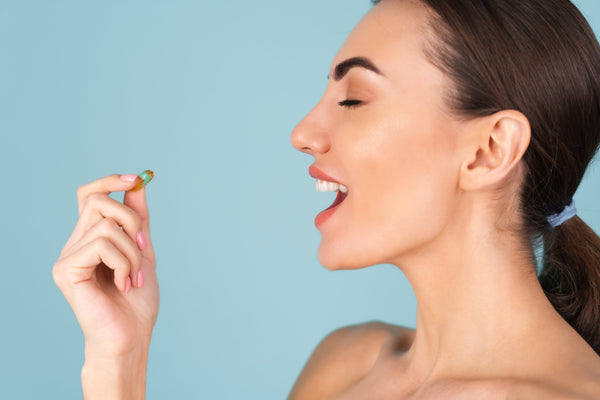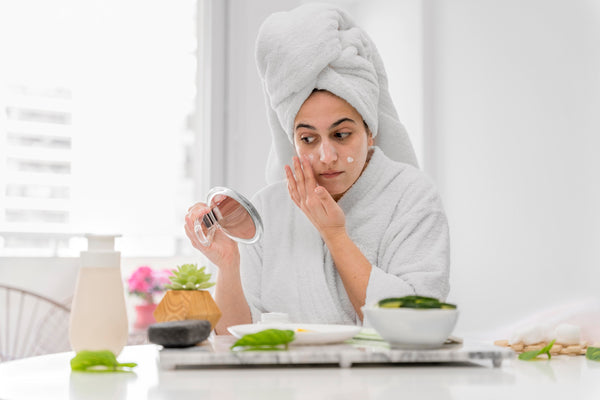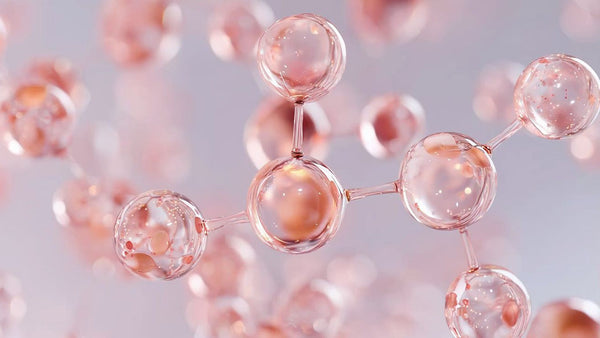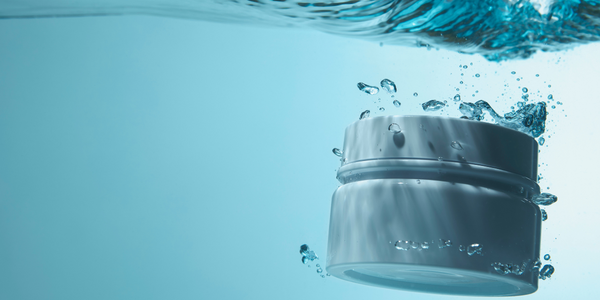The dark spots on your skin or that uneven skin tone could be the signs of skin pigmentation. Fortunately, you can deal with these signs in the beginning and prevent skin pigmentation from becoming worse. This blog talks about 5 effective things you can do to reduce the signs of pigmentation.
What is Skin Pigmentation?
The colour of your skin is defined by a pigment known as melanin, which is produced by melanocytes. When the melanocytes become unhealthy or are damaged (mostly because of UV rays), the production of melanin is impacted, which can lead to pigmentation/colouration on your skin (whole body or patches).
Signs of Pigmentation
Before diving into how to reduce pigmentation, it's important to recognize the signs that you may be experiencing this condition. Here are some common signs of skin pigmentation:
-
Dark Spots: Small, flat, darkened areas of skin, usually brown or black, often appearing on areas frequently exposed to the sun, such as the face, hands, and arms.
-
Uneven Skin Tone: Patches of skin that are darker than the surrounding areas, creating a mottled or blotchy appearance.
-
Freckles: Small brown spots usually found on the face, neck, chest, and arms, often becoming darker after sun exposure.
-
Melasma: Larger, darker patches that commonly appear on the face, especially on the cheeks, forehead, nose, and upper lip, often related to hormonal changes.
-
Age Spots: Also known as liver spots, these are larger, flat areas of darker pigmentation that occur on sun-exposed areas of the skin.
Ways to Combat Skin Pigmentation
Apple Cider Vinegar
Several health enthusiasts consume apple cider vinegar because of its weight loss benefits. However, topical application of ACV can also help lighten pigmentation. Here’s how you can use apple cider vinegar to help reduce skin pigmentation:
- Mix equal parts of water and apple cider vinegar in a container.
- Apply this mixture wherever you notice pigmentation.
- Now, let this mixture be for a few seconds.
- Rinse using lukewarm water.
- Repeat the entire process twice a day for the best results.
Make sure to choose a reliable ACV product to ensure no side effects.
Red Onion
Red onion, used in almost every vegetable preparation in North India, offers amazing benefits for your skin. It can help you deal with acne, improve skin glow, reduce pigmentation, and reduce the signs of photoaging.
Also, red onion (Allium cepa L.) is an active ingredient in several scars and skin lightening creams. So, you can purchase skin lightening creams containing Allium cepa and use them as directed.
Green Tea Extract
Green tea is popular among health enthusiasts for its benefits, such as better detoxification, digestion, and enhanced metabolism. Also, according to research, topical application of green tea is known to reduce skin pigmentation. Here’s how you can use green tea:
- Drop a green tea bag in a container of boiled water.
- Now remove the tea bag from hot water and let it cool.
- Gently rub the tea bag over the pigmented patches.
- Repeat the above steps twice each day for benefits.
Black Tea Water
According to an animal study, the application of black tea water twice each day, 6 days a week, for 4 weeks, reduced dark spots on guinea pigs. Here’s how you can use black tea water for benefits:
- Drop a tablespoon of black tea leaves into a container of boiling water.
- Soak for 2 hours and then strain to remove black tea leaves.
- Now soak some cotton in the tea water and apply wherever required.
- Repeat this process each day, 6 days a week for 4 weeks.
Aloe vera
Aloe vera can be dramatically helpful for your skin. For instance, aloesin, a compound derived from aloe vera, is known to show a positive impact on pigmentation. Here’s how you can use aloe vera to help reduce pigmentation:
-
Apply aloe vera gel (pure) on the pigmented areas before sleeping.
-
When you get up the next morning, use lukewarm water and rinse.
-
Repeat the above process daily until you see change or improvement.
These are some common ways that can help you deal with the symptoms of pigmentation. However, there’s an even more effective way to manage pigmentation: Glow Collagen from Wellbeing Nutrition (WBN).
Reduce Skin Pigmentation with Glow

Glow Collagen is a unique skincare supplement from Wellbeing Nutrition that comes with wild-caught marine collagen peptides along with Glutathione, SkinAx, Resveratrol, Bromelain & Goji berry, etc. These ingredients help:
- Reduce pigmentation
- Improve collagen content and thus elasticity
- Achieve skin radiance
- Regenerate and renew skin cells
- Deal with acne, fine lines, and wrinkles
- Improve skin density, complexion, and texture
With Glow collagen, can not only reduce the pigmentation symptoms but you can also ensure good overall skin health. Glow Collagen is paleo and keto-friendly and free from soy, dairy, sugar, and preservatives. It means Glow Collagen is a completely safe and clean product you can rely upon.
So, if you want to deal with pigmentation and enhance overall skin health, order this amazing skincare product now: Glow Collagen.
Wrapping Up
Most of the time, skin pigmentation is due to the harmful effects of UV rays from the sun. However, you can deal with this issue by following the aforementioned tips. Also, don’t forget to include Glow Collagen from Wellbeing Nutrition for enhanced benefits. However, you’ll need help from a medical healthcare expert if the pigmentation symptoms indicate vitiligo, melasma, or albinism. It’s because these issues require a very specific type of treatment.
FAQs
1. How often should I use these remedies for best results?
For best results, natural remedies like apple cider vinegar, red onion, green tea extract, black tea water, and aloe vera should be used consistently. Most remedies require daily or twice-daily application over several weeks to show noticeable improvements. However, individual results may vary, and patience is key.
2. When should I see a dermatologist about pigmentation?
If pigmentation persists, worsens, or spreads rapidly despite home remedies, it’s advisable to see a dermatologist. Conditions like melasma, vitiligo, or post-inflammatory hyperpigmentation may require targeted treatments such as topical creams, laser therapy, or chemical peels for effective management.
3. Can dietary changes help with pigmentation?
Dietary changes can play a crucial role in managing pigmentation. A diet rich in antioxidants, vitamin C, vitamin E, and omega-3 fatty acids helps protect the skin from oxidative stress, which can trigger pigmentation. Staying hydrated and reducing processed foods can also promote healthier skin.
4. How does melanin production affect pigmentation?
Melanin, the pigment responsible for skin color, is produced by melanocytes. When melanin production is triggered by UV exposure, hormonal changes, or skin damage, it can lead to pigmentation. Managing sun exposure, using sunscreen, and maintaining a proper skincare routine can help regulate melanin levels and prevent dark spots.
5. How to reduce pigmentation on the face?
To reduce pigmentation on the face, a combination of natural remedies, a nutrient-rich diet, and skincare products with ingredients like collagen, glutathione, and resveratrol can help even out skin tone. Consistently protecting the skin from sun damage and maintaining hydration can further enhance results.
References
Bastonini, E., Kovacs, D., & Picardo, M. (2016). Skin Pigmentation and Pigmentary Disorders: Focus on Epidermal/Dermal Cross-Talk. Annals of dermatology, 28(3), 279–289. https://doi.org/10.5021/ad.2016.28.3.279
Kondo, T., Kishi, M., Fushimi, T., Ugajin, S., & Kaga, T. (2009). Vinegar intake reduces body weight, body fat mass, and serum triglyceride levels in obese Japanese subjects. Bioscience, biotechnology, and biochemistry, 73(8), 1837–1843. https://doi.org/10.1271/bbb.90231
Kapuścińska, A., & Nowak, I. (2015). Zastosowanie kwasów organicznych w terapii trądziku i przebarwień skóry [Use of organic acids in acne and skin discolorations therapy]. Postepy higieny i medycyny doswiadczalnej (Online), 69, 374–383. https://doi.org/10.5604/17322693.1145825
Hollinger, J. C., Angra, K., & Halder, R. M. (2018). Are Natural Ingredients Effective in the Management of Hyperpigmentation? A Systematic Review. The Journal of clinical and aesthetic dermatology, 11(2), 28–37. https://www.ncbi.nlm.nih.gov/pmc/articles/PMC5843359/
Marrelli, M., Amodeo, V., Statti, G., & Conforti, F. (2018). Biological Properties and Bioactive Components of Allium cepa L.: Focus on Potential Benefits in the Treatment of Obesity and Related Comorbidities. Molecules (Basel, Switzerland), 24(1), 119. https://doi.org/10.3390/molecules24010119
Sarkar, R., Arora, P., & Garg, K. V. (2013). Cosmeceuticals for Hyperpigmentation: What is Available?. Journal of cutaneous and aesthetic surgery, 6(1), 4–11. https://doi.org/10.4103/0974-2077.110089
Choi, S. Y., & Kim, Y. C. (2011). Whitening effect of black tea water extract on brown Guinea pig skin. Toxicological research, 27(3), 153–160. https://doi.org/10.5487/TR.2011.27.3.153

























